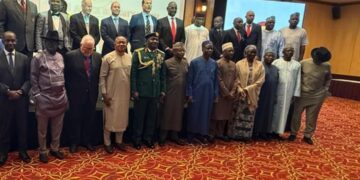In a seismic disclosure, the Senate of the Federal Republic of Nigeria’s ad-hoc committee has unearthed massive revenue leakages amounting to over US$303 billion linked to the Nigerian National Petroleum Company Limited (NNPC)’s now-defunct Direct Sale Direct Purchase (DSDP) programme for the period 2015 to 2022.
Key findings include:
-
Between 2017 and 2021, more than US$22 billion went missing in domestic-crude mismatches, tax-oil and royalty diversions.
-
A shortfall of US$81 billion was identified when comparing crude-proceeds declared by NNPC/DPR against actual remittances to the Central Bank of Nigeria for 2016-17.
-
Ongoing investigations project that over US$200 billion remains unaccounted for, with funds traced through domestic and international front-accounts.
National-Security Implications: Why this matters beyond the ledger
-
Defense & Hydrocarbon Funding Shortfall
Nigeria’s defence posture, counter-insurgency operations, maritime domain awareness and critical infrastructure protection rely heavily on oil-revenue flows. A diversion of such magnitude directly weakens the budget envelope for national-security expenditure. -
Eroded Sovereign Capability
When crude proceeds drain off-book, the state’s ability to finance strategic initiatives (naval patrols, aerial surveillance, intelligence gathering) is undermined — creating vulnerabilities that adversaries can exploit. -
Compromised Intelligence & Oversight
The report cites “weak surveillance systems, human interference and lack of coordination among security and regulatory agencies” as enablers of the theft.Such institutional breakdowns undermine the state’s ability to detect, attribute and deter non-state actors, organised theft networks, and sabotage operations in the oil-patch. -
Budget Crisis Meets Borrowing Pressure
Simultaneously, President Tinubu has submitted to the Senate a letter requesting approval for a ₦1.15 trillion domestic loan to fund the 2025 budget deficit. This move underscores the fiscal stress facing the federal government — stress that is aggravated by the discovered diversion. The borrowing raises additional risks: higher debt servicing, tighter fiscal space for security operations, and increased reliance on foreign-currency exposures. -
Geostrategic Rivalries & Energy Security
Nigeria’s role as Africa’s largest oil producer and its maritime corridor in the Gulf of Guinea make energy-sector integrity a national-security priority. Large-scale revenue diversion invites external interference, weakens deterrence, and could embolden criminal networks or hostile proxies around oil infrastructure, pipelines and ports.
What Nigeria must do — Strategic Action Steps
-
Immediate forensic recovery: Deploy specialised teams with inter-agency coordination (Navy, NUPRC, EFCC, DSS) to trace funds and assets, secure tax-oil and royalty flows, and prosecute perpetrators.
-
Strengthen systems & oversight: Invest in digital metering, real-time surveillance of oil flows, joint military–regulatory operations in the Niger Delta and maritime domain.
-
Reprioritise defence funding: Ensure budgetary shifts maintain adequate allocations for security operations, even amid borrowing and fiscal adjustment.
-
Reduce fiscal leakages as debt rises: With the proposed domestic loan adding to debt servicing burdens, closing the oil-revenue gap is essential to free up funds for national defence and intelligence.
-
Link energy security with national security doctrine: Recognise hydrocarbon integrity not only as economic but as strategic. Encourage holistic policies where energy, intelligence, defence and diplomacy converge.
Conclusion
The Senate’s disclosure is more than a financial scandal — it is a wake-up call for national security. Nigeria cannot borrow its way out of a crisis that is rooted in systemic fiscal leakage. As the government seeks additional borrowing, the urgency to safeguard energy revenues, stabilise defence funding and reinforce institutional integrity becomes paramount.
The message is clear: Money lost is sovereignty weakened. Nigeria’s strategic independence, domestic stability and regional leadership all hinge on reclaiming control of its resources — and ensuring fraud in the oil sector doesn’t become an unspoken vulnerability in its national-security architecture.
DefenceTimesNG.Africa will continue to monitor this developing story — tracking how recovery efforts, institutional reforms and defence-sector funding intersect at this crossroads of fiscal, energy and security policy.







